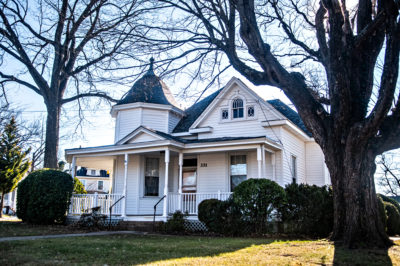For years, the University of Lynchburg has offered students with shared interests — athletics, academics, clubs, etc. — the opportunity to live together in what it calls Special Interest Housing. Recently, Courtney Kelsey, assistant director of housing and residence life, started thinking about how the experience could be better and more purposeful.
“As we began to move forward with Vision 2020 and began to institute residential learning communities within the traditional halls, I began to look at the institutional pillars of leadership, service, and academics,” she said.
“I researched similar programs at other institutions, and found that our Special Interest Housing process really needed to have a ‘purpose’ that made the experience meaningful. I considered the following questions: Why did these students want to live together? How can they have a shared living-learning experience that builds upon each student’s personal and academic interests?”

The result is a reimagined program that gives sophomores, juniors, and seniors with shared interests the opportunity to not only live together, but also serve together in the greater Lynchburg community.
“I wanted the program to model the Residential Learning Community program within the residence halls, which focuses on a shared, high-impact experience,” Kelsey said. “Thus, the program shifted toward a service-learning project.
“The goal is for students to identify a service opportunity that all group members are passionate about. Then, they will identify a community partner to connect with and complete service hours throughout each semester. There is a fall reflection opportunity, and then in the spring semester, each group will give a presentation on their overall experience.”
This year, 23 students from five campus groups — equestrian, theatre, Student Judicial Board, men’s cross-country, and Club Rock Climbing — are living in Special Interest Housing.
The students, who apply to participate in the program, live in groups of three to six per University-owned house. In addition to maintaining a 2.5 overall GPA, they are expected to be “upstanding citizens on campus and in the community, acting as character and academic role models to others.”
Each semester, they are required to complete a minimum of eight service hours, which can be done on or off campus. This year, Special Interest Houses have partnered with Lynchburg Parks and Recreation, the Central Appalachia Climbers Coalition, the Lynchburg Humane Society, Park View Community Mission, and the University’s sustainability program and grounds staff.
Jen Thrift ’21, a criminology and math double major and Westover Honors Fellow, lives in the Student Judicial Board house. “I wanted to live in an SJB house to be around like-minded people,” she said. “Living in an SJB house with other students who are knowledgeable on and respect University policies provides a sense of comfort and support.
“I get to live with SJB members who have come to be some of my best friends from our time together on the board. Also, we were all interested in doing more community service.”
Thrift and her housemates volunteered at Park View Community Mission, a nonprofit located about a mile from the University that assists people living in poverty. They worked mostly with Park View’s Food for Families program, sorting donated food that’s given to local families facing food insecurity.
“It’s rewarding to know that we are able to assist Park View with providing food for families of all sizes, especially knowing that these families and individuals are local to the Lynchburg community,” Thrift said.
“Many students may only stay in Lynchburg for the time needed to complete their degree, but all students will remember the impact the local community had on our experience here. It’s so important that we … give back to the Lynchburg community, which has provided us with a home while we obtain our degrees.”
Thrift added that the “new perspective” she gained from volunteering at Park View is the “biggest thing” she’s gotten out of the Special Interest Housing experience.
“In college, we have easy access to food through dining services on campus,” she said. “It’s easy to live in your own bubble and forget that many people in our community and country as a whole struggle with food security. This community service opportunity reminds us of how important it is to take time to give back to your community in any way you can.”

